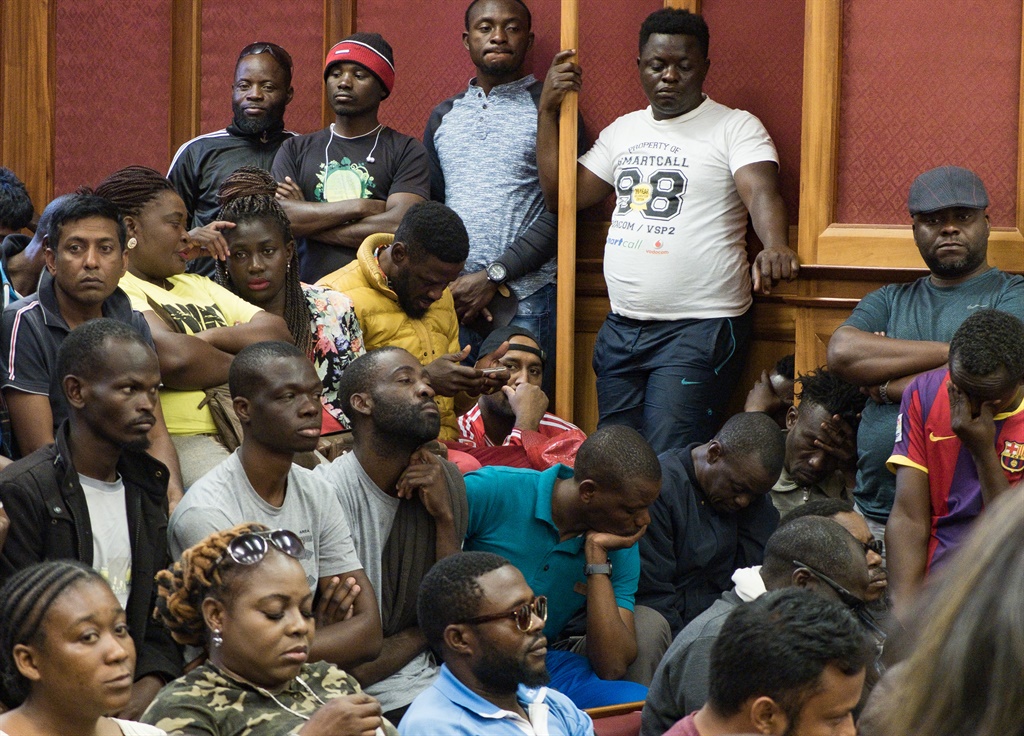


Refugees and asylum seekers packing a courtroom in the Western Cape High Court. File Photo. (Jan Gerber/News)
- The Gauteng High Court in Pretoria has granted a court order that allows asylum seekers and special permit holders to receive the Covid-19 Social Relief of Distress grant, Scalabrini Centre said.
- The order allows them to receive the grant subject to Sassa’s criteria and even if their documents expired during the lockdown.
- The minister of social development has 10 working days to finalise these changes.
The Gauteng High Court in Pretoria ruled on Thursday that special permit holders and asylum seekers must be included in the R350 Covid-19 Social Relief of Distress grant (SRD grant).
The Scalabrini Centre, represented by Norton Rose Fulbright, secured the court order allowing asylum seekers and special permit holders in the country to apply for the grant, it said in a statement on Friday.
Asylum seekers and special permit holders from Angola, Lesotho and Zimbabwe, as well as asylum seekers whose permits or visas were valid on 15 March but might not be now, can access the Covid-19 grant based on the South African Social Security Agency’s (Sassa) criteria.
The court said the minister of social development must, within five days of the order being granted, calculate the cost of this inclusion and make the necessary changes to the legislation.
“Eligible asylum seekers and special permit holders whose applications for the Covid-19 SRD grant are approved will be entitled to payment of the grants as if their grants had been approved on the date of this order,” the court said.
Urgent litigation
Last month, Scalabrini, an NGO which supports migrants, launched urgent litigation against the exclusion of asylum seekers and special permit holders from the relief grant.
“The coronavirus knows no borders, and does not stop to ask for one’s nationality status. Citizens and foreign nationals in South Africa have been seriously impacted by the National State of Disaster and lockdown,” the centre said in a statement last month.
“The Covid-19 SRD grant was announced as an emergency measure to try and provide relief for persons not receiving any other form of assistance or income.
“We are demanding that the SRD grant be opened to asylum seekers and special permit holders, as it is irrational and unreasonable to exclude such persons from being able to apply for the grant solely on the basis of their nationality or immigration status.”
The grant, which seeks to aid those negatively impacted by the Covid-19 pandemic, is currently only open to South Africans, refugee status holders and permanent residents.
In court papers, the centre argued the suffering of asylum seekers and special permit holders is particularly severe as some people’s visas had expired during the lockdown. They face dismissal from work, no income and frozen accounts.
The papers read:
Asylum seekers and special permit holders are excluded from the majority of governmental financial relief packages.
“Many asylum seekers and special permit holders are excluded from governmental food parcels as a 13-digit ID number is required to register and UIF applications for non-South Africans are subject to specific delays, as confirmed by the Department of Labour,” it said.
Scalabrini added it had received an increase in requests for help with food, rent and electricity.
The court order
According to the NGO, applicants for the grant will still be subject to Sassa’s criteria. Only those who do not receive an income, any other grant or UIF are eligible.
Asylum seekers and special permit holders whose documents expired during the lockdown will still be able to apply for the SRD grant and will need to provide their documents issued by the South African government.
“This SRD grant is a ‘special’ grant rolled out for a six-month period only, from May 2020, and only eligible candidates will receive R350 each month during that limited period.
“Claims for May have already concluded and so persons affected by this court order should be entitled to claim from June onwards,” Scalabrini said.

